Anal fissures are a painful tearing of the thin tissue that lines the anus. The most common symptoms are pain with bowel movements and bleeding. Some anal fissures are minor and will go away without treatment or with simple lifestyle changes like increasing fiber intake. Others can be more persistent and painful and require treatment with medications or even surgery in some cases. Since the area of concern is limited only to the anus, usually topical medications are the first-line treatment for anal fissures. These may include drugs like nifedipine, nitroglycerin, and diltiazem.
For most patients, a non-surgical option is ideal and topical medications are easy to use with only a few side effects. Many studies shown that surgery is the most effective way to treat an anal fissure – however topical therapy performs well in most trials and is well tolerated by patients.
Nifedipine
Nifedipine is a calcium channel blocker (in the same class of drugs as diltiazem). Commercially available forms of nifedipine are in tablet form for oral use to manage angina, high blood pressure, and preterm labor. However a compounding pharmacy can make this medication in the form of a topical.
In a study of 31 patients suffering from anal fissures, 27 patients completed a treatment course with nifedipine topical. Of these patients, 23 experienced a total remission of their symptoms. The 4 unhealed patients were divided by 2 patients who went to undergo a lateral sphincterotomy and another 2 who continued with nifedipine treatment and eventually healed. This healing rate is significant and shows that nifedipine topical can help treat anal fissures and prevent them from becoming chronic.
In another study of 8 patients, all responded to treatment with nifedipine within 2 to 6 weeks. Of these, 3 were healed in 2 weeks, another 3 in 4 weeks, and the rest by week 6. There were no side effects reported by patients in this study.
Diltiazem
Diltiazem is another calcium channel blocker similar to nifedipine for treating anal fissures. Technically diltiazem and nifedipine are calcium channel blockers indicated for treating heart conditions and not for anal fissures – although they are widely prescribed for this use. Diltiazem relaxes the sphincter and helps improve blood flow to the anus to improve the healing time of a fissure.
In one study of diltiazem ointment, anal fissures healed in 24/30 who used the ointment and in 10/30 patients who did not. This shows a significantly increased healing time for patients who are using a topical.
Nitroglycerin
Similar to other topicals used to treat anal fissures, nitroglycerin is approved for treating angina pectoris. It is available commercially in a few different forms. Nitroglycerin helps relax the internal anal sphincter by mediating nitric oxide. The spasming of the anal muscles associated with anal fissures impedes blood flow to the anus which makes it difficult for the fissure to heal. In studies it has been shown that nitroglycerin is effective for treating chronic anal fissures.
Common Side Effects
With all of these topical medications, common side effects can include lightheadedness and headache. With continued use, these side effects sometimes diminish. However these are important side effects to be aware of as you start treatment. There may be some itchiness or irritation at the application site but it likely will not be more severe than the pain of the fissure. Typically these topicals are not used longer than 3 months so there is little research on side effects from prolonged use. If a treatment course of topicals does not heal a fissure surgery is usually the next option.
Application Instructions
You should always follow the application instructions provided to you by your doctor and pharmacist. Typically a small pea sized amount is applied to the affected area every 12 hours however these instructions can vary. It is good to wear a disposable glove when applying the ointment to avoid the medication being absorbed into your skin outside the treatment area and for sanitary purposes.
Compounding Topical Ointments for Anal Fissures
Certain strengths of nitroglycerin topical are commercially available however diltiazem and nifedipine are often compounded. Nitroglycerin cream may also be compounded if a different strength is required or if a patient needs to avoid certain inactive ingredients. A compounding pharmacy can make a nitroglycerin, nifedipine, or diltiazem ointment in a variety of strengths depending on the severity of the anal fissure.
Articles
Aggressive treatment of acute anal fissure with 0.5% nifedipine ointment prevents its evolution to chronicity – World Journal of Gastroenterology
Treatment of Anal Fissure with Nifedipine/Lidocaine Ointment – The American Journal of Gastroenterology

